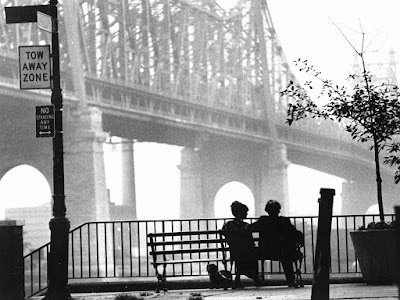A great romantic comedy. The script was co-written by
Marshall Brickman and Woody Allen. Critics often say that it is a cinematic love
letter to New York. Issac, a 40-year-old neurotic writer, is romantically
involved with Tracy, a 17-year-old student. His love life is a complicated and
slippery terrain: he is tormented by his second ex-wife Jill, a lesbian who has
written a memoir where she tells all the intimate details of their marriage. He
leaves his job to work on a memoir about living in New York. However,
everything gets complicated when he starts dating Mary, his best friend's
former lover. The reaction of the critics was very favorable and the film
raised more than $ 485 thousand dollars in its first week. And, in all time,
the amount reached $ 39.9 million. Adjusted for inflation, it grossed more than
$ 127 million, making it the second largest movie at Allen's box office, after
Annie Hall. The musical score is fantastic and homage to George Gershwin.
Allen would repeat with Manhattan, almost mimetically, the
formula that gave him success a couple before, a work that goes back to
addressing the meaning of relationships in New York in the 70s, from the
perspective of the economic and intellectual high class. On this occasion,
instead of showing an unfolded character, as he did in Annie Hall, he introduces
his work by means of an omniscient narrator who not only narrates but also
tells his own story, since he is a writer in the creative process of a novel.
Thus, in the very opening of the film, this voiceover describes New York as a
city in constant black and white, a rhetorical resource that justifies the
romantic monochromatic treatment of the film itself. Since then, the film /
novel could be understood as the soundtrack of a relationship, since Allen is
responsible for alternating significant scenes of iconic moments in his private
life with songs that evoke the actions we see on screen. Rhapsody in Blue is the theme selected for the opening and closing
of the story. The chords composed by George Gershwin allow us to emphasize the
emotional charge that Allen intends to infer in the presentation of the city,
while the literal definition of rhapsody as musical work composed of fragments
of other works, leads us to identify the director's tribute to cinema, music
and literature. He loves and she loves
could be cataloged as "the song" of Isaac and Tracy, his 17-year-old
girlfriend, and will be played while they ride in a carriage, in love with
Central Park. The title and the images reveal a love that, in some way, is
intuited as a passenger, unstable by the use of the undefined present that does
not allow knowing the recipient of such love, but the presence of a momentary
passion. Later, when Isaac, after having abandoned Tracy, decides to return to
find her repentant, the same song will sound again with a very different
meaning, which comes to affect the resurgence -present- of a past love that was
thought forgotten. . It is a pure and naive love of the innocent youth of
Tracy.
I've got a crush on
you will be the melody with which we identify the relationship between
Isaac and Mary, the woman for whom he abandoned Tracy, who was the best friend’s
lover, Yale. We see how the intricate web of sentimental relationships gets
complicated, but Woody Allen succeeds in proposing an identifying sound support
to make the assimilation process much simpler. The title, which would have another
meaning like "being crazy about you", reinforces Mary's initiative to
renounce her anti-artistic principles to accompany Isaac to the cinema. The
song will also mention a love at first sight, arising not so much from the
physical attraction as from the connection that you feel when you look at it,
that will be just what happens with the protagonist when you see Mary for the
first time, and decide to leave in an unreflective way to Tracy. Finally, we
have selected the theme Do, do, do,
from Gershwin, as well as the previous ones. This song is presented according to its composers as a furtive and playful kiss and would reinforce the idea of that second adolescence lived by Mary and Isaac. Two adults who are not expected to have such and ardent and childish behavior but the mature relationship they were not predestined to have. For this reason, the couple will not be able to have control and everything will be in a constant search for a Utopian and unattainable love for someone like Isaac, a passionate dreamer, and above all and inveterate loner.
Directed by Woody Allen
Produced by Charles H. Joffe
Written by Woody Allen and Marshall Brickman
Cast:
Woody Allen
Diane Keaton
Michael Murphy
Mariel Hemingway
Meryl Streep
Anne Byrne
Music by George Gershwin played by the New York Philharmonic, Zubin
Mehta and the Buffalo Philharmonic, Michael Tilson Thomas
Cinematography Gordon Willis


No comments:
Post a Comment